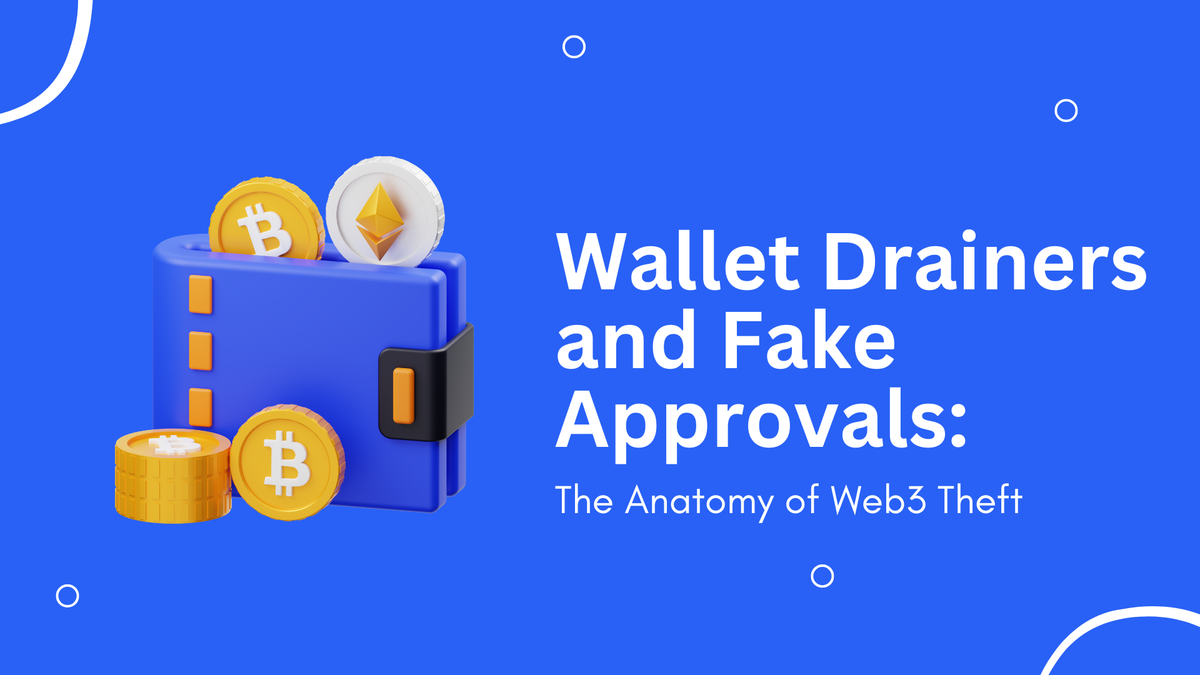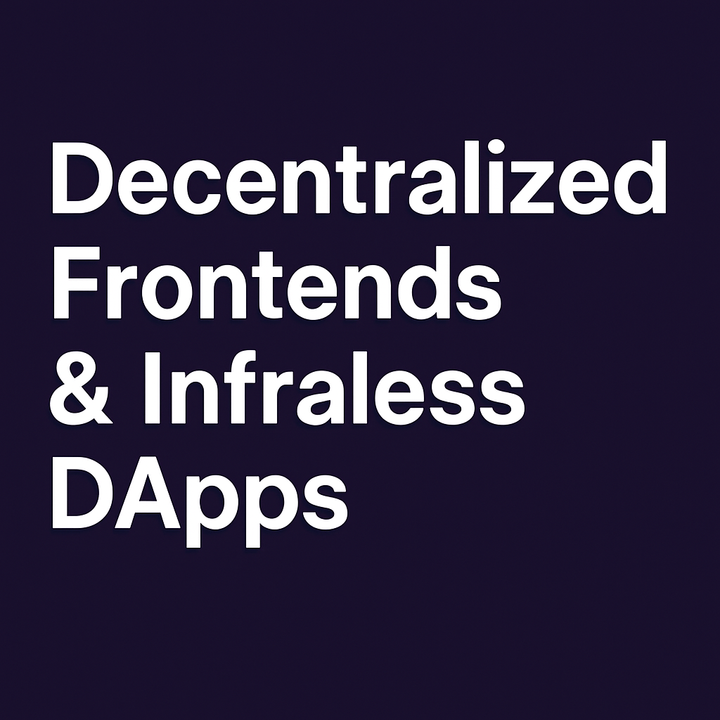Wallet Drainers and Fake Approvals: The Anatomy of Web3 Theft

Web3 promises decentralization, digital ownership, and financial autonomy, but it also comes with new types of risks. One of the most common and damaging threats facing Web3 users today is wallet drainers that exploit fake token approvals. These scams often go unnoticed until it's too late, resulting in irreversible loss of funds.
What Is a Wallet Drainer?
A wallet drainer is a malicious script or application that tricks users into giving it permission to access and drain tokens or NFTs from their wallet. These drainers don’t need to steal your seed phrase; they exploit your trust.
Typically, users are lured to phishing sites pretending to be NFT minting platforms, airdrop portals, or staking dApps. Once you connect your wallet and approve a transaction, the drainer is authorized to move tokens out of your wallet without needing further confirmation.
These scams are highly deceptive. In 2023 alone, wallet drainers stole over $295 million in crypto assets from unsuspecting users through phishing campaigns and malicious approvals.
Understanding Approval Phishing
Web3 wallets like MetaMask operate based on token approval mechanisms. Before a dApp can interact with your tokens, you must sign a transaction that approves a smart contract to access your assets.
This approval is where phishing scammers strike.
In approval phishing, scammers create fake platforms or clone legitimate ones. When you interact with them, you unknowingly sign a transaction that gives unlimited access to your tokens or NFTs. The malicious contract doesn’t transfer assets immediately, but it gains permission to do so at any time.
For example:
- You visit a fake site claiming to offer a free NFT mint.
- You connect your wallet and sign a prompt labeled “Approve” or “Mint.”
- Behind the scenes, this is an
approve()orsetApprovalForAll()call. - The attacker’s address is now authorized to transfer your assets, often without you realizing it.
Approval phishing is particularly dangerous because it looks harmless. Users often click through wallet prompts quickly, especially if they’re excited about an airdrop or NFT mint. But in Web3, a single careless approval can drain your wallet.
How You Unknowingly Expose Funds
Here are common ways users fall victim:
1. Trusting Fake Sites: Scammers clone popular platforms like Uniswap or OpenSea with identical designs and domains like un1swap.org. When you connect and approve, the contract is malicious. Double-check URLs before connecting your wallet.
2. Blind Approval Signing: Many users don’t read wallet prompts carefully. If MetaMask says “Allow spending of your tokens?”, and you click "Confirm" without checking the address or permissions, you may be handing over full control.
3. Old, Unused Approvals: Even legitimate platforms you used in the past may still have spending rights. If those platforms are compromised, attackers can use existing approvals to drain your wallet. That’s why it’s important to review and revoke token permissions regularly.
How to Audit and Revoke Token Permissions
Luckily, Web3 transparency allows you to check and revoke token permissions anytime. Here’s how:
✅ Use Revoke Tools
Sites like Revoke.cash or Etherscan’s Token Approval Checker let you:
- Paste your wallet address.
- See which contracts have access to your tokens.
- Revoke approvals you no longer trust.
Revoke.cash supports multiple chains, including Ethereum, BNB Chain, and Polygon. Just connect your wallet and click “Revoke” next to any suspicious or outdated entry.
Each revocation sends a transaction (with gas fee) that sets the approved amount to zero, effectively cutting off access.
✅ Use MetaMask Portfolio DApp
MetaMask Portfolio now includes a “Token Approvals” feature that shows what contracts have permission to access your assets. You can review and revoke from there as well.
How to Spot and Avoid Drainer Scams
Here are security tips to keep your wallet safe:
Always Verify URLs: Only connect your wallet to verified, trusted platforms. Bookmark known dApps, and avoid clicking links from random Discord DMs or Twitter replies.
Limit Approvals: When prompted to approve a token, choose limited amounts instead of unlimited (if your wallet allows). This limits damage if something goes wrong.
Never Rush: Scammers thrive on urgency. Avoid falling for “Limited slots remaining!” or “You’ve won a surprise airdrop!” messages. Always slow down and verify.
Use Hardware Wallets: For large holdings, a hardware wallet like Ledger or Trezor adds a physical confirmation step for every transaction. Even if a drainer gets permission, they can’t act without your device.
Stay Informed: Follow official Twitter handles and Discord of tools like:
These sources often warn the community of active scams and new drainer tactics.
If You Suspect You Approved a Scam…
Act fast:
- Go to Revoke.cash or Etherscan and revoke the permission immediately.
- Transfer remaining funds to a new wallet if necessary.
- Report the incident to your wallet provider or platform.
- Warn others—you may prevent someone else from falling victim.
Unfortunately, blockchain transactions are irreversible. You cannot “undo” a malicious approval once the assets are transferred. But revoking permissions can stop further losses and prevent access to future deposits.
Conclusion
In Web3, you control your wallet, but that also means you’re responsible for its security. Understanding wallet drainers and approval phishing is essential for protecting your digital assets.
Here’s a quick recap:
- Wallet drainers don’t steal your keys; they trick you into signing away control.
- Approval phishing makes you unknowingly authorize bad actors to access your tokens or NFTs.
- Use tools like Revoke.cash, Etherscan, and MetaMask Portfolio to regularly audit and revoke permissions.
- Never approve transactions unless you’re 100% sure what you’re doing.
With awareness and a little caution, you can enjoy Web3 securely. Always verify before you approve.
References
- Chainalysis – Crypto Drainers Are Getting Smarter
https://www.chainalysis.com/blog/crypto-drainers - MetaMask – What Is a Malicious Token Approval?
https://support.metamask.io/stay-safe/safety-in-web3/what-is-a-malicious-token-approval - Revoke.cash – Revoke Your Token Approvals
https://revoke.cash - Etherscan – Token Approval Checker
https://etherscan.io/tokenapprovalchecker - Fake “Mining” Scams: a Familiar Foe in a New Disguise
MITOSIS Official links:
GLOSSARY
Mitosis University
WEBSITE
X (Formerly Twitter)
DISCORD
DOCS


Comments ()